Getting Down to the Nuts and Bolts
From July 21st to July 29th, 2023, I completed a full-length traverse of the entire Southern Alps from Hirogawara in Yamanashi Prefecture to Akaishi Onsen Shirakabaso hot spring in Shizuoka Prefecture, a distance of some 94 km. It was my fourth hike to the area and my first time further south than Mt. Warusawa. I took it on as both a personal challenge and something I had been eager to try since reading about it in Lonely Planet Hiking in Japan.
It was on the cards to do it last year, but with some huts and transport services still impacted thanks to COVID and other pressing issues at home, I decided to postpone it. In the following post, I describe the planning I undertook, with a particular focus on the logistics and practicalities of undertaking this multi-day adventure. It also includes a deep dive into the gear and food I brought along with me.
It goes without saying that this is one long, tough hike through some of Japan’s most stunning and remote mountains. In the Cicerone guidebook, which covers the trek, the author’s Tom Fay and Wes Lang make no bones about it, declaring that it’s “Japan’s toughest yet most rewarding multi-day hike”. In total, it traverses six of the 100 Famous Japanese Mountains or Hyakumeizan, including four I hadn’t yet climbed. Rather than staying in huts along the way, which would have made it decidedly easier, I did it completely self-supported. It also included a side trip to Mt. Tekari, which lies in the deepest part of the Southern Alps.

Southern Alps Traverse food including Grana Padano cheese.
Why 9 Days?
Both Lonely Planet Hiking in Japan and the Cicerone guidebook, which cover the trek, suggest 8 days, including the return trip to Mt. Tekari. By all means, if you’re a strong hiker who doesn’t mind long days, this is a good way to tackle it. It’s also possible to finish it even quicker in 6 days, although to do this expect to put in 13-plus hour days. My personal preference was to limit my days to no more than 10 hours. I find that if I am hiking any longer, fatigue starts to kick in, and the fun factor quickly fades. Whichever way you decide, try to stick to it, as the final two campsites at Hijiridaira Hut and Chausu Hut require advanced reservations, along with, of course, the return bus to Shizuoka Station.
Some other reasons you might want to consider a more ‘leisurely’ 9-day approach include:
▪ Provided you get an early start you can have most of the hiking done by lunchtime.
▪ Breaks up stages 3 to 5 that have back-to-back 10-plus hour days.
▪ Ensures Mt. Akaishi and Mt. Hijiri are not climbed on the same day. The two toughest Hyakumeizan on this hike are Mt. Shiomi from Kumanodaira Hut and Mt. Hijiri from Hyakkenbora Hut.
▪ The weather in the Southern Alps is fickle at the best of times, and thus the best views are usually early in the morning. Expect clouds and mist, particularly on the higher peaks, to start rolling in from 10 am onward.
▪ Offers some extra wiggle room due to unforeseen events, such as being held up by bad weather.




.
As a general rule, I was packed up and on the trail by 4:30 am each day, arriving at the next campsite no later than 2 pm. While the temperature in the morning and nights were cool, hiking at 2,500 metres or more can still feel blazingly hot in the middle of the day, and it is really easy to get sunburnt walking on the exposed ridges above the tree line if you’re not careful. Thunderstorms are also an all-too-common threat in the mid-to-late summer afternoons. On two separate occasions, it bucketed down. An advantage of arriving at the campsite a bit earlier is the chance to rinse out your socks and sun hoodie, dry them in the sun, and score one of the better campsites.
GPX TrackKML TrackGSI MAPSouthern Alps Traverse July 21st to July 29th, 2023
Hirogawara to Akaishi Onsen Shirakabaso hot spring (9 days approx. 94 km)
Day 1: Hirogawara 広河原 (water available) ➩ Shiraneoike-goya 白根御池小屋 (water available) ➩ Kitadake Katano-koya 北岳肩ノ小屋 (tent 1,500 yen) (water available 1 litre 200 yen!) or water source 30 min return. 5hrs 30mins / 5.2km
https://katanokoya.com/stay/
Day 2: Kitadake Katano-koya 北岳肩ノ小屋 ➩ Kitadake-sanso 北岳山荘 (water available) ➩ Aino-dake 間ノ岳 ➩ Kumanodaira-goya 熊ノ平小屋 (tent 2,000 yen) (water available) 6hrs / 7.7km
https://nanpusu.jp/yamagoya/report08.html
Day 3: Kumanodaira-goya 熊ノ平小屋 ➩ Shiomi-goya 塩見小屋 (only bottled water 500ml 450 yen!) ➩ Sanpukutoge-goya 三伏峠小屋 (tent 1,600 yen) (lunch served from 10:00-13:00) (water source 20 min return) 10hrs 30mins / 14.4km
http://sanpukutouge.com/service/
Day 4: Sanpukutoge-goya 三伏峠小屋 ➩ Takayamaura hinan-goya 高山裏避難小屋 (tent 2,000 yen) (water source 20 min return) 6hrs / 8.9km
https://www.t-forest.com/alpsinfo/climber/lodgeinfo/
Day 5: Takayamaura hinan-goya 高山裏避難小屋 ➩ Hyakkenborayama-no-ie 百間洞山の家 (tent 2,000 yen) (water available) 10hrs / 12.5km
https://www.t-forest.com/alpsinfo/climber/lodgeinfo/
Day 6: Hyakkenborayama-no-ie hinan-goya 百間洞山の家 ➩ Hijiridaira-goya 聖平小屋 (tent 2,000 yen advanced online reservations are required) (water available) 7hrs 30 mins / 9.6km
https://ikawa-kanko.com/#hijiridaira
Day 7: Hijiridaira-goya 聖平小屋 ➩ Chausu-goya 茶臼小屋 (tent 2,000 yen x 2 advanced online reservations are required) (water available) 4hrs 30mins/ 6.4km https://nanpusu.jp/yamagoya/report02.html
Day 8: Chausu-goya 茶臼小屋 ➩ Tekari-dake 光岳 (water available) ➩ Chausu-goya 茶臼小屋 9hrs 30mins / 18.3km
https://www.chillnn.com/1863f95fe2d74
Day 9: Chausu-goya 茶臼小屋 ➩ Hatanagi Daichi Dam 畑薙第一ダム ➩ Akaishi Onsen Shirakabaso hot spring 赤石温泉白樺荘 6hrs 30mins / 15.7km
https://www.justline.co.jp/news/20230627/13849/
Access
Getting to and from the respective trailheads is via public transportation. For 2025 buses from Kofu Station to Hirogawara run from June 19rd to November 3rd with additional daily buses from July 19th to August 24th (no booking required) (2,400 yen, 2 hrs). There’s also a 300 yen contribution fee, payable in cash, as the bus route travels along the Minami-Alps Forest Road. To give myself plenty of time on the first day, I caught the 6:55 am bus. For the return journey, there is one daily bus that leaves the Hatanagi Temporary Parking Lot 畑薙臨時駐車場 at 2:30 pm (arrives at Akaishi Onsen Shirakabaso hot spring bus stop at 14:40) to Shizuoka Station that runs from July 12th to August 17th. This bus needs to be booked online prior to departure (3,500 yen, 3hrs and 30mins). Outside of these dates it may be possible to catch a bus from the Akaishi Onsen Shirakabaso to Ikawa Station, but as this is a community bus, priority is given to local residents.
Budget
Camping meant the costs were kept to a minimum. Post-COVID, however, most huts have doubled their campsite fees and are now charging 2,000 yen a night. Needless to say, if you plan to stay in huts, it will be significantly more expensive, as the huts have also increased the cost of accommodation, with the average hovering around 13,000 yen per person per night, including dinner and breakfast. The cost breakdown was as follows:
Buses to and from the trailheads: 5,800 yen
Campsite fees: 13,100 yen
Miscellaneous: Water, toilet, drinks, and snacks, approx. 3,200 yen
Total: 22,100 yen vs. (staying in huts) 110,900 yen
Cut and Run
If, for whatever reason, I felt I couldn’t continue with the hike, it was necessary to figure out where to cut and run. For this I identified two such locations. The first was on day four near Sanpuku-toge, where there are two daily buses to Ina-Oshima Station on the JR Iida Line. On my previous hike to Mt. Warusawa four years ago, I also finished here. On day seven, it was possible to make a long descent off the ridgeline down to the Sawarajima Lodge. For this option to pan out, I would have needed to spend a night at one of the Tokushu Tokai Forest huts, for example, the Takayamaura-goya or Hyakkenbora huts, in order to meet the pre-conditions to board the shuttle bus back to the Hatanagi Dachi Dam bus stop.
Fitness
Personally, I think I’m not in too bad shape. I run and workout 2-3 days a week at my local gym, and I sauna 4-6 times a week. The point to be made here is that not only do saunas reduce your blood pressure, but this study showed that post-exercise sauna bathing is an effective way to enhance performance in hot environments. At the same time, I’d have to return to the halcyon days of university to recall the last time I embarked on a week-long hike. Fast forward to now, just months away from my 50th birthday, and the situation called for a slightly different approach. Rather than stretching myself to my limits each day, which I might have done in more youthful times, the goal at the end of each day was to arrive feeling like I could have gone further if I had to.

Gossamer Gear ditty bags.
Gear
As with any overnight hike, you need to strike a balance between bringing the absolute essentials and those little extras, which add weight but help make the trip just a little safer and more comfortable. The challenge this time is that it all needed to fit into my 48-litre KS Ultralight Gear KS50. This is by far the longest hike I had done with this pack, and I was not overly enthused about fitting the gear puzzle together each morning. In order to make the process just that little bit easier, I did a pack shakedown item-by-item to help identify areas where I could shed weight including dispensing with superfluous stuff sacks. Inside the pack, I used an extra-thick plastic pack liner to keep things dry.
Having said that, a few luxury items included an AOKA carbon tripod, indispensable for any trailblazing solo content creator. The nice thing about this tripod is that you can ditch the ball head, making it only 350 g. The other two items were a Merino wool T-shirt and lightweight shorts with a combined weight of 200 g. After a long day hiking, there was nothing better than slipping into a light pair of shorts and a top to mill around the campsite. All told the pack came in at just on 14 kg including food, and with water added to the mix, it made for a heavyish pack, at least at the beginning stages.

Weight reduced by repackaging.

Foodstuffs repackaged into individual Ziplock bags.
Food:
Breakfasts consisted of muesli and dried mangoes, with snacks for lunch and dehydrated food for dinner. Given the dearth of dehydrated foods in Japan which also tend to be low on calories, I brought some Back Country Cuisine meals that I picked up last time I was in Australia. I also ditched the retort kare or boil-in-the-bag curries that I’d normally bring due to their heft. To further reduce weight, I repackaged foodstuffs into individual Ziplock bags and vacuum sealed meals such as ramen and yakisoba. During the first few days, I had Grana Padano cheese, which kept all right, along with Hagoromo tuna in canola oil eaten with pita bread.
To replenish sodium and electrolytes on the hike, I had Morinaga inTablet Salt Plus which includes sodium, calcium, and vitamins, and Morinaga Salted Caramel, which includes magnesium, calcium, and sodium. For drinks, gone was the tea and coffee, and instead, returned to an old childhood favourite, Milo with powdered milk. The advantage of Milo is that it can be consumed hot or cold.

Morinaga inTablet Salt Plus and Morinaga Salted Caramel.
Along the way, I plotted a couple of strategic stops at huts to supplement my fare. I hoped to grab a curry and rice at the Sanpuku-toge hut for lunch on day three but unfortunately missed the cut off time, though did manage to get dinner at the at the Chausu-goya hut on day seven. I also the bought cup of noodles at the Hijiridaira Hut.

Ramen and yakisoba vacuum sealed.
It worked out to be 2200 kcal/day, which, was sufficient as I didn’t drop any weight. I tend to lose my appetite when I hike, so I think I would have struggled to have consumed much more. My ‘secret weapon’ this time around was to add flaxseed oil, which is very rich in fatty acids and is calorie-dense (9 calories per gram), to most meals. The nice thing about flaxseed oil is that it has a fairly neutral taste. I endeavoured to pack foods with high kcals, with an overall average of approximately 4.2 calories per gram. In total, the food weight came in at 4.7 kg for the nine days. Included below is a comprehensive list of the food and gear I brought with me.
.
9-Day, Southern Alps Traverse Gear List
| Pack | Weight | |
| Backpack | KS Ultralight Gear KS50 | 630 g |
| Plastic pack liner | Extra thick 0.080mm x 1 | 106 g |
| 736 g | ||
| Shelter | ||
| Tent | MSR FreeLite 1 Ultralight | 943 g |
| Footprint | Universal 1 Person | 121 g |
| Tent stakes | MSR Mini-Groundhog x 10 | 107 g |
| 1171 g | ||
| Sleep System | ||
| Sleeping bag | Nanga Aurora Light 450 DX | 865 g |
| Sleeping pad | Nemo Tensor Insulated Regular | 510 g |
| Pillow Case | MSR Trekker | 58 g |
| 1433 g | ||
| Hydration | ||
| Water bottle I | Nalgene wide-mouth 1 litre x 1 | 178 g |
| Water bottle II | Platypus 2.5 litre x 2 | 72 g |
| 250 g | ||
| Cook System | ||
| Pot | Evernew Ti Mug Pot 900 | 99 g |
| Stove | Primus Femto Stove P-115 | 56 g |
| Spoon | Humangear GoBites Uno | 15 g |
| Stuff sack | Ultralight Tyvek | 10 g |
| Gas canister I | Primus Power Gas IP-250T x 1 | 383 g |
| Gas canister II | Primus Power Gas IP-110 x 1 | 189 g |
| Lighter | Butane lighter x 2 | 50 g |
| Towel | Quick dry | 18 g |
| Food bag | Gossamer Gear Snack Sack | 37 g |
| Rubbish bags | Plastic film x 2 | 16 g |
| 873 g | ||
| Clothing (Packed) | ||
| Merino wool T-shirt | Super Natural M Logo Tee | 118 g |
| Shorts | Under Armour | 88 g |
| Down jacket | Montbell Plasma 1000 | 130 g |
| Fleece jacket | Millet K Lightgrid Hoodie M | 286 g |
| Thermal bottoms | Uniqlo Heattech Extra Warm x 1 | 178 g |
| Thermal top | Polypropylene crew top x 1 | 144 g |
| Socks | Darn Tough Light Hiker Micro Crew x 1 | 69 g |
| Underwear | UA Original Series 6" Boxerjock x 1 | 66 g |
| Beanie | Mammut Merino Helmet Beanie | 19 g |
| Gloves | Berghaus trekking mesh glove | 26 g |
| Rain pants | Outdoor Research Helium | 190 g |
| Jacket | Mammut Quantum II GORE-TEX Pro-Shell | 375 g |
| Stuff sack | Sea to Summit Ultra-Sil | 35 g |
| 1724 g | ||
| Electronics | ||
| Handheld GPS | Garmin Oregon 600t | 156 g |
| AA alkaline batteries | Panasonic EVOLTA NEO x 8 | 198 g |
| Emergency locator beacon | COCOHELI radio transmitter | 20 g |
| Smartphone | OPPO Reno3 A | 204 g |
| Power bank | Anker PowerCore III 5000 | 110 g |
| Charging cable | USB C cable 60cm | 14 g |
| Headlamp (inc. batteries) | Black Diamond SpotLite 160 Lumens | 58 g |
| 760 g | ||
| Photography | ||
| Camera | Pentax K-3 Mark III | 817 g |
| Lens | Pentax-DA 20-40mm | 291 g |
| Extra battery | Pentax D-LI90P x 3 | 231 g |
| Camera stuff bag | Isuka Weathertech 5 litre | 40 g |
| Tripod | Aoka CMP163CL | 350 g |
| 1729 g | ||
| First-aid | ||
| Adhesive skin closures | 3M Steri-Strip x 3 | 5 g |
| Adhesive wound dressing | 3M Medipore + Pad x 1 | 4 g |
| Transparent dressing | 3M Tegaderm x 4 | 10 g |
| Band-Aid | Jumbo size bandages x 1 | 1 g |
| Band-Aid | Regular size bandages x 2 | 1 g |
| Gauze pads | 5cm x 7.5cm x 2 | 6 g |
| Water purification tablets | Taharmayim x 13 | 3 g |
| Loxoprofen sodium hydrate | Loxonin tablets x 10 | 5 g |
| Topical iodine solution | Popiyodon 10% cotton stick x 1 | 5 g |
| Skin surgical tape | 3M Micropore x 1 | 6 g |
| Ointment | Gentamicin sulfate x 1 | 13 g |
| Lip conditioner | ChapStick x 1 | 8 g |
| Ear pugs | In plastic case x 1 | 5 g |
| Mask | Surgical x 1 | 3 g |
| First-aid case inc. Ziploc | Granite Gear Air Pocket | 18 g |
| 94 g | ||
| Toiletries | ||
| Toothbrush | In plastic holder | 27 g |
| Dental floss | Rucello mint waxed | 11 g |
| Toilet paper | Kirkland Signature | 60 g |
| Emollient cream | Sudocrem | 30 g |
| Hand sanitiser | Quick drying gel 40 ml | 45 g |
| SPF50+ sunscreen | In MUJI bottle | 20 g |
| Vitamins | Multivitamins | 10 g |
| 203 g | ||
| Miscellaneous | ||
| Ditty bag large | Gossamer Gear | 15 g |
| Ditty bag large | Gossamer Gear | 12 g |
| Wallet | Granite Gear trail wallet | 9 g |
| ID/bank | Credit card/cash | 40 g |
| Hiking insurance | jRO card | 3 g |
| Key | House key | 18 g |
| Pocket Knife | Victorinox Classic | 21 g |
| Sunglasses | SWANS Airless-Leaf fit | 16 g |
| Reading glasses | No-name | 16 g |
| Sunglasses case | SWANS | 47 g |
| Map | Yama to Kogen Chizu x 2 | 33 g |
| Compass | Suunto A-30 L CM Explorer | 32 g |
| 262 g | ||
| Food | ||
| Breakfast | ||
| Muesli | Seitenbacher Muesli Cereal x 1 | 400 g (1528 kcal) |
| Dried mangoes | Philippine mangoes x 2 | 400 g (1344 kcal) |
| (Approx. 3.6 calories per gram) | 800 g (2872 kcal) | |
| Lunch | ||
| Tuna pack | Hagoromo canola oil x 3 | 180 g (618 kcal) |
| Cheese | Grana Padano | 125 g (498 kcal) |
| Pita bread | Delsole | 160 g (466 kcal) |
| (Approx. 3.4 calories per gram) | 465 g (1582 kcal) | |
| Dinner | ||
| Back Country Cuisine | Thai chicken curry x 1 | 90 g (395 kcal) |
| Back Country Cuisine | Lamb Fettuccine x 1 | 90 g (374 kcal) |
| Back Country Cuisine | Chicken Carbonara x1 | 90 g (413 kcal) |
| Back Country Cuisine | Moroccan lamb x 1 | 90 g (355 kcal) |
| Ramen | Ichiran Tonkotsu x 1 | 135 g (471 kcal) |
| Yakisoba | Maruchan x 1 | 155 g (584 kcal) |
| Onisi | Shrimp pilaf x 1 | 100 g (361 kcal) |
| Onisi | Plain white rice x 1 | 100 g (366 kcal) |
| Seiyu | Chili con carne x 1 | 120 g (121 kcal) |
| Flaxseed oil inc. HDPE bottle | Nisshin | 250 g (1960 kcal) |
| (Approx. 4.2 calories per gram) | 1220 g (5400 kcal) | |
| Snacks | ||
| Protein bars | Giga Protein Chocolate x 9 | 585 g (2988 kcal) |
| Mixed nuts | Almonds, cashews, giant corn x 1 | 350 g (1820 kcal) |
| Beef jerky | Tengu Brand x 1 | 160 g (448 kcal) |
| Heat-resistant chocolate | Libera x 5 | 250 g (1310 kcal) |
| Salted caramel | Morinaga x 3 | 216 g (900 kcal) |
| Salt replacement | Morinaga inTablet Salt Plus x 3 | 234 g (858 kcal) |
| (Approx. 4.6 calories per gram) | 1795 g (8324 kcal) | |
| Drinks | ||
| Powdered milk | Morinaga Creap Creamy Powder x 1 | 200 g (1000 kcal) |
| Milo | Nestle Milo x 1 | 240 g (960 kcal) |
| (Approx. 4.5 calories per gram) | 440 g (1960 kcal) | |
| (Approx. 4.2 calories per gram) | 4720 g (20138 kcal) | |
| Food (Approx. 2200 kcal/day) | ||
| *Clothing (Worn) | ||
| Pants | The North Face Alpine Light Pant | 350 g |
| Sun hoodie | Montbell Cool Full-Zip Hoodie | 177 g |
| Cap | Mountain Equipment Aerofoil Cap | 20 g |
| Underwear | UA Original Series 6" Boxerjock | 66 g |
| Socks | Darn Tough Light Hiker Micro Crew | 69 g |
| Shoes | Salomon XA ROGG 2 | 670 g |
| Knee sleeve | Vantelin knee support sleeve | 26 g |
| ABC watch | Casio Protrek PRW-3000 | 62 g |
| 1440 g | ||
| Total pack weight | 13965 g |





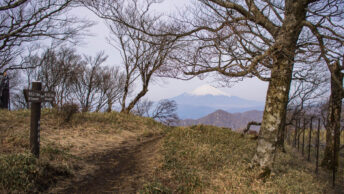
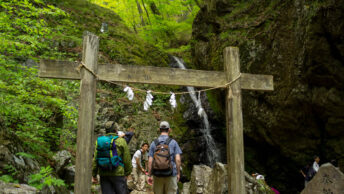
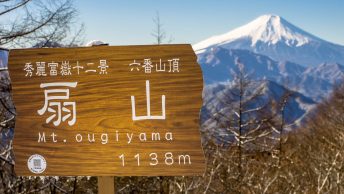
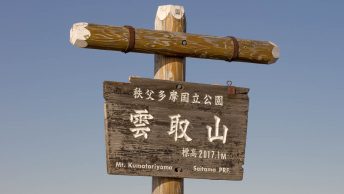
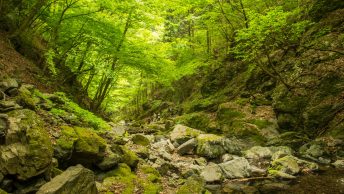
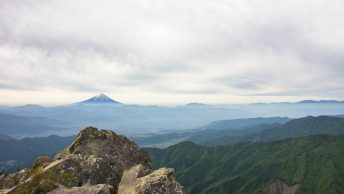
Thanks for sharing your adventure and all the logistics and approach to make it successful. Congratulations!
Thanks a lot, Alain. I’ll also be posting some route notes along with some musings from the hike.
This is gold!! I am planning to do this in less than two weeks, although in the opposite direction (as Hirogawara is better connected, it can give me more flexibility for the finish time). I was struggling to find some updated and reliable information in particular for water sources, thank you so much!! I will keep an eye out for any new post with route notes 🙂
I plan longer days, in your experience were campsites already full by around 4 pm or 5 pm? I am a bit concerned about the post-covid hiking boom, especially since I will be doing this around obon.
No problem, Carlos, and it’s nice to hear that it’s going to come in handy for you. As you point out, it can be done in either direction. I found a mix of people travelling from both trailheads.
Apart from Kitadake Katano-koya Hut, which was quite busy, the other campsites were all less than half full. However, as you’re going to be hiking during the busiest season, I recommend arriving at each campsite before 3 pm to secure a good spot. After this time, you may have to squeeze your tent into a less desirable position, especially if you happen to arrive on a weekend. Try hitting the trail as early in the morning as possible each day.
Thanks David for the reply with useful advice! I plan to do long 12 hour days, starting at around 3 am, and I plan to move fast (complete this in 3 days, skipping the detour to Tekari), carrying only 8.5 kg including food and water, and running when not too steep or technical. One of my concerns is traffic jams in sections of chains or ladders, or in general any narrow section where one must yield to traffic coming from the other direction. Does any potentially very busy section like this come to your mind? Or am I correct in simply expecting that it will just get progressively busier the closer I get to Akadake?
While there are occasional chains, ladders, and roped sections, they’re fairly spread out and unlikely to cause bottlenecks. I can’t recall having to wait any meaningful length of time for people to pass by. In fact, on some early morning starts, I didn’t see anyone for the first couple of hours!
That is awesome! I’m jealous.
ps Are you still missing my new posts? I think everyone else is getting them.
Thanks mate 🙂 It was a ripper of a hike.
I’m getting them again! It worked after I added the email to my safe list.
Congratulations on a successful adventure and thank you for an excellent report that will be of great value to many folk, me included.
I appreciate that, Stewart! Thanks also for your tidbits of advice.
Otsukaresamadesu !
and congratulations.
and thanks a ton for giving minute details of your gear list.
That traverse is classic and a dream for me.
Cheers Naresh! It’s been a pipe dream for a number of years, but I’m so glad I was able to complete it. In time, I’m sure you’ll also get there.
Congratulations! I hope to do similar hike but North Bound on the 17th of August but have planned for 5-6 days. I consider myself above average hiker and have done the whole Shin Etsu Trail in 4 days but I now have my doubts. Worst case, I will finish at Sanpuku and escape down Torikura trail.
Carlos: I might see you on the trail! Here is my route plan if interested.
https://www.komoot.com/collection/2136799/-southern-alps-traverse?ref=undefined
Thanks Thomas. It sounds a bit tough, but give it a shot; as you say, you always tap out at Sanpuku-toge if need be. I wish you all the best with it.
Hi David
It sounds like a brilliant hike!
The detailed gear list is really helpful for anyone considering a multi day hike.
Thanks for sharing!
Cheers Melissa
Thanks a lot, Melissa. It was indeed brilliant, and I feel quite humbled by the experience.
This is very detailed! Thank you for sharing!
Thank you, and I am glad to hear it.
Thank you very much for the details post and valuable information! I would like to do this traverse solo at the end of August and the only thing I am concerned about is navigating on the trail. I usually use Yamap, but since there no such activities on Yamap, could you please tell me how did you navigate on the trail ? Is there an app or any other way to navigate without the internet connection ?
I would appreciate the response.
Hi Yaryna,
Thanks for your comment and question!
Regarding navigation, you can download my GPX track directly from the trail report. Once you have the GPX file, you can upload it to YAMAP to create an activity. Here are instructions on the YAMAP website: https://bit.ly/4c3F9E3
Hi David – thanks so much for such comprehensive detail here (as ever on Ridge line!). Hugely helpful and much appreciated.
A question on food, if I may – in the article, you say “given the dearth of dehydrated foods in Japan which also tend to be low on calories”… By this do you mean that you tend to find that the retort/dehydrated meals available in Japan are lower on calories than you’d like after a long day hiking? Or that you’re looking for lower calorie options than available easily here?
Thanks!
Hi Iain,
Thanks for the comment and question. Yes, I’m referring to the former. A major issue with dehydrated meals here is that they don’t pack enough calories. For example, a typical Montbell risotto only has just over 300 kcal. What’s more, there aren’t many options available. I’ve always found this a bit odd, given how popular hiking is here.
Thanks David! That’s a shame (and would be the first time Montbell has let me down…). Useful to know. Might follow your suggestion of flaxseed oil to top up the calories!
Hi David,
Thanks for sharing this great post.
I am planning to do the south alps for 5 days for its south part(From Lodge Sawarajima to Mt.Waruzawa, then to Mt.Tekari, then all the way down to the Hatanagi.), start at the end of August.
Just wondering how to preserve the cheese in the mountain?
I am thinking to put the cheese in refrigerator and wrap it with clothes when leaving my home at Tokyo, all the way until I get to the start point.
However, not sure if I should just leave it in the bag with room temperature during the hike?
Would be great if you can share some advices.
Thanks!
Thanks for your question, Gin. I take it you’re referring to the Grana Padano cheese. It actually keeps really well, so you shouldn’t have any trouble carrying it in your pack for 4–5 days, especially at the end of August when the temperatures are a little cooler. Just wrapping it in some wax paper is usually enough to help preserve its freshness.